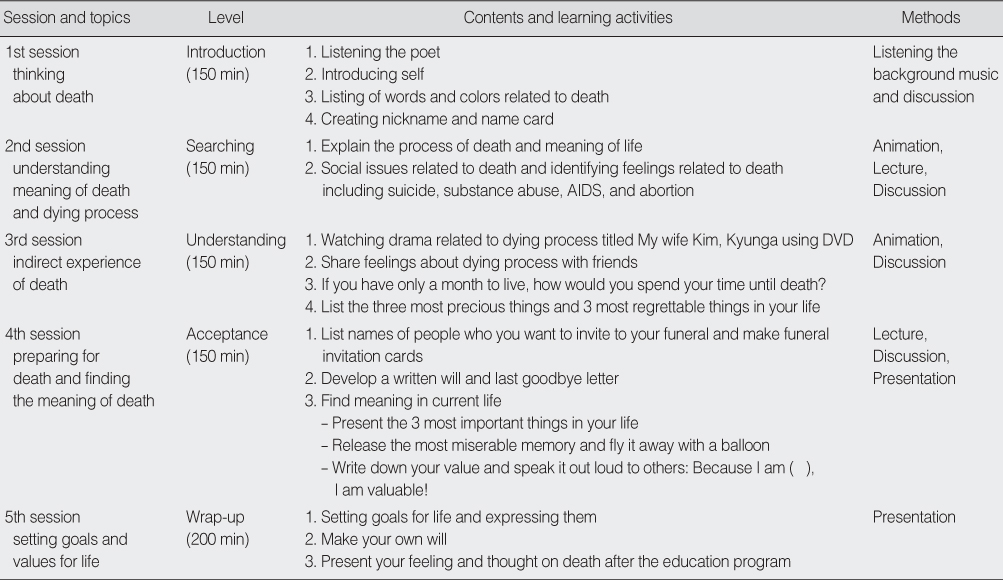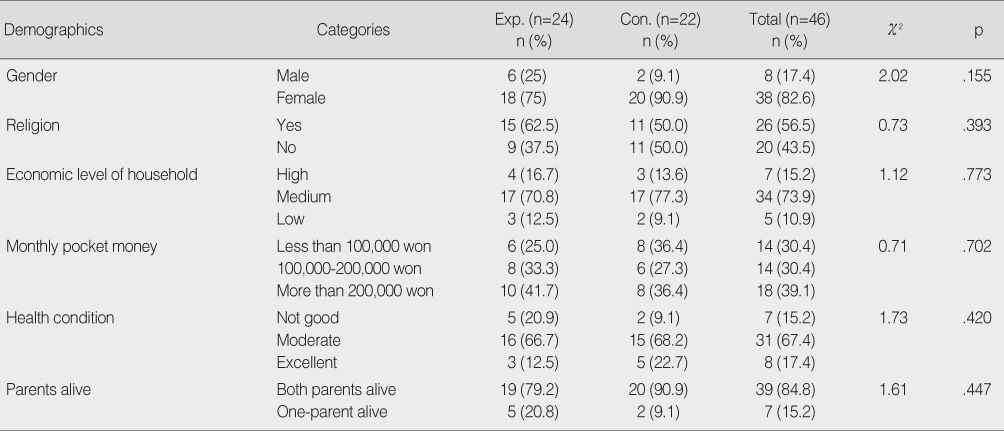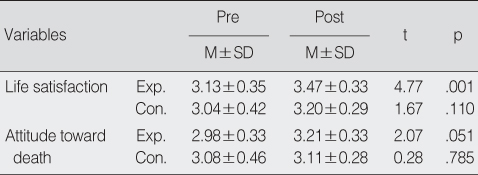Articles
- Page Path
- HOME > J Korean Acad Nurs > Volume 39(1); 2009 > Article
-
Original Article
- Effects of a Death Education Program on Life Satisfaction and Attitude toward Death in College Students
- Eun Hee Kim, Eunjoo Lee
-
Journal of Korean Academy of Nursing 2009;39(1):1-9.
DOI: https://doi.org/10.4040/jkan.2009.39.1.1
Published online: February 28, 2009
1Doctoral Student, College of Nursing Kyungpook National University, Daegu, Korea.
2Associate Professor, College of Nursing Kyungpook National University, Daegu, Korea.
- Address reprint requests to: Lee, Eunjoo. Department of Nursing, College of Nursing, Kyungpook National University, 101 Dongin-dong, Jung-gu, Daegu 700-422, Korea. Tel: 82-53-420-4934, Fax: 82-53-421-2758, jewelee@knu.ac.kr
Copyright © 2009 Korean Society of Nursing Science
Abstract
-
Purpose
- The purpose of this experimental study was to examine the values of a death education program developed to improve life satisfaction and attitude toward death in college students.
-
Methods
- The death education program was developed and then used with 22 college students for 5 weeks, once a week for 150 min. Before and after the intervention, students responded a questionnaire developed to measure life satisfaction and attitude toward death. t-test, χ2-test, and paired t-test with the SPSS program were used to analyze the data.
-
Results
- The death education program significantly improved life satisfaction but had no statistically significant effect on attitude toward death. There was a significant difference in life satisfaction between the experimental and control groups but not in attitude toward death.
-
Conclusion
- Based on the above results, it is apparent that the death education program has an affirmative effect on life satisfaction in college students and some impact on attitude toward death. We suggest, therefore, that the death education program should be used with all human beings to help them recognize the values of themselves and their current lives and improve their satisfaction with life.
- 1. Aday R. Elderly reactions to a death education program in a nursing home setting. Gerontology & Geriatric Education. 1998;15:3–9.Article
- 2. An CO. Study on the necessity of death education. 2001;Seoul, Myon Ggi University. Unpublished master's thesis.
- 3. Chung SK. A relational study on attitudes toward death between life satisfaction and values of juveniles. 1992;Seoul, Ewha Womens University. Unpublished master's thesis.
- 4. Cohen J. Statistical power analysis for the behavioral sciences. 1988;2nd ed. New Jersey, Lawrence Erlbaum Associates.
- 5. Coleman WT. The effect of an instructional module on death and dying on the death anxiety of emergency medical technician trainees. 1983;Indianapolis, IN, USA, Purdue University. Unpublished doctoral dissertation.
- 6. Collett L, Lester D. Fear of death and the fear of dying. Journal of Psychology. 1969;72:179–181.PubMed
- 7. Donald M, Dower J, Correa-Velez I, Jones M. Risk and protective factors for medically serious suicide attempts: A comparison of hospital-based with population-based samples of young adults. The Australian and New Zealand Journal of Psychiatry. 2006;40:87–96.ArticlePubMedPDF
- 8. Educational Research Institution of Hospice. Hospice and palliative care. 2006;Seoul, Gun Ja Publishing Company.
- 9. Go SD, Kim EJ, Kim YK. Study about analyzing elements of preparatory education of death affecting uneasiness of death to the aged. Journal of Korean Society for Health Education and Promotion. 1999;16:81–92.
- 10. Higgins S. Death education in primary school. International Journal of Children's spirituality. 1999;4:77–99.Article
- 11. Jang OH. Study about death of the aged: Focusing on the attitude of death. 2004;Seoul, Seo Gang University. Unpublished master's thesis.
- 12. Jo HJ. Effect of the death education program on the death anxiety and attitudes toward nursing care of the dying patients of nursing student. 2004;Jinju, Gyeong Sang University. Unpublished master's thesis.
- 13. Jo KH, Lee HJ, Lee YJ. The development and application of cyber lectures about death. Journal of Korean Academy of Nursing. 2007;37:442–452.PubMed
- 14. Jo KH, Lee HJ. Relationship between self-efficacy, depression, level of satisfaction and death attitude of college students. Journal of Korean Academy of Nursing. 2008;38:229–237.ArticlePubMed
- 15. Jung BR. The meaning and direction of preparatory education of death. Kyungpook Journal of Nursing Science. 2006;10:49–60.
- 16. Jung JG. A study of death education-Focused on a world of Shih Shih Wu Ai in Hua-yen philosophy. Journal of East Asian Social Thoughts. 2006;13:205–230.Article
- 17. Kang KA, Kim SJ, Song MK, Sim S. Reliability and validity of an instrument for adolescents meaning in life scale. Journal of Korean Academy of Nursing. 2007;37:625–634.PubMed
- 18. Kao SF, Lusk B. Attitudes of Asian and American graduate nursing students towards death and dying. International Journal of Nursing Studies. 1997;34:438–443.ArticlePubMed
- 19. Kawagoe H, Kawagoe K. Death education in home hospice care in Japan. Journal of Palliative Care. 2000;16:37–45.ArticlePDF
- 20. Kim SN, Choi SO, Lee JJ, Sin KI. Effects of death education program on attitude to death and meaning in life among university students. Journal of Korean Society for Health Education and Promotion. 2005;22:141–153.
- 21. Kim SY, Lee EG. Study of university students' satisfaction of their life. Haksang Sangwhal Yeongu. 1996;32:74–93.
- 22. Lally MT. Death anxiety and fear of death attitudes: A death education program for student nurses. 1983;Chicago, IL, USA, Loyola University of Chicago. Unpublished doctoral dissertation.
- 23. Lee HJ, Kim MH. A path model for self-identity and hopelessness to suicidal ideation of college students. Korean Journal of Youth Studies. 2007;14:243–264.
- 24. Lee JY. Juveniles' awareness about death and religious education. Korean Journal of Religious Education. 2004;19:39–56.
- 25. Mogi N, Masuda Y, Hattori A, Naito M, Iguchi A, Uemura K. Effects of death education on self-determination in medical treatment in university students. Geriartrics and Gerontology International. 2003;3:200–207.
- 26. Nunnally JC. Psychometric theory. 1978;New York, McGrow-Hill.
- 27. Oh KH. A study on the influence factor on the attitude toward death in the elderly: Focused on the elderly in Mapo-Gu, Seoul. 2007;Seoul, Yonsei University. Unpublishedmaster's thesis.
- 28. Park HS, Kwon BS. The satisfaction measurement of the undergraduate students and related elements. Journal of Korean Academy of Psychiatric and Mental Health Nursing. 2006;15:48–56.
- 29. Smith-Cumberland T. The evaluation of two death education programs for EMTs using the theory of planned behavior. Death Studies. 2006;30:637–647.ArticlePubMed
- 30. Warren WG. Death education and research: Critical perspectives. 1989;New York, NY, The Haworth Press.
REFERENCES
Figure & Data
REFERENCES
Citations

- Seeing life through life: Unpacking life education in intergenerational learning in China
Hao Cheng
Humanities and Social Sciences Communications.2024;[Epub] CrossRef - Experiences of Chinese advanced cancer patients after attending a “four-stage” death education programme: A qualitative study
Bing Wu, Ping Zhu, Tao Wang, Jing-Yu(Benjamin) Tan, Zhenglan Cao, Jing Wan, Suya Wu, Liuliu Zhang, Yihui Xing
European Journal of Oncology Nursing.2023; 66: 102361. CrossRef - Death Education for Palliative Psychology: The Impact of a Death Education Course for Italian University Students
Lucia Ronconi, Gianmarco Biancalani, Georgiana Alexandra Medesi, Hod Orkibi, Ines Testoni
Behavioral Sciences.2023; 13(2): 182. CrossRef - Death education and photovoice at school: A workshop with Italian high school students
Melania Raccichini, Gianmarco Biancalani, Luca Franchini, Silvia Varani, Lucia Ronconi, Ines Testoni
Death Studies.2023; 47(3): 279. CrossRef - Exploring Filipinos’ Preferred Funerary Arrangement for Terminal Departure
Lourdes Urbano Agbing
Illness, Crisis & Loss.2022; 30(2): 240. CrossRef - The Collision Between the Classroom Voice(s) and the Voice of the Mainstream Culture on End-of-Life to Cultivate Students' Attitudes Toward Death in China
Ling Meng, Li Yi, Tian Li
Frontiers in Psychology.2022;[Epub] CrossRef - The Effects of a Death Preparation Education Program on Death Anxiety, Death Attitudes, and Attitudes toward End-of-Life Care among Nurses in Convalescent Hospitals
Eun-yeong Chu, Sun-hee Jang
The Korean Journal of Hospice and Palliative Care.2021; 24(3): 154. CrossRef - Nursing students’ relationships among resilience, life satisfaction, psychological well-being, and attitude to death
Jihyun Kim
Korean Journal of Medical Education.2019; 31(3): 251. CrossRef - Present-orientation and the outcome of contemplating death
Ryo Ishii
Time & Society.2018; 27(3): 312. CrossRef - The Concept of Death and the Growth of Death Awareness Among University Students in Hong Kong
Wai-ying Wong
OMEGA - Journal of Death and Dying.2017; 74(3): 304. CrossRef - Effects of Band Therapy Using Music on Grasping Power, Depression, and Personal Relationships in Nursing-Home-Dwelling Elderly Individuals
Eun Kyung Chang, Heeok Park, Miran Jung, Hae Kyeong Lee, Jieun Park, Mijung Park, Minsuk Gang
Open Journal of Nursing.2016; 06(11): 958. CrossRef - Convergence Analysis of Factors Influencing the End-of-life Care Attitude in Undergraduate Nursing Students
Seung Ae Yang
Journal of the Korea Convergence Society.2016; 7(4): 141. CrossRef - Effects of Death Preparation Education on Awareness of Hospice Palliative Care and Withdrawing Life Sustaining Treatment in City Dwellers
Pei-Ling Tsung, Yoon Joo Lee, Su Yeon Kim, Seul Ki Kim, Si Ae Kim, Hyeon Ji Kim, Yi Nam, Suk Young Ham, Kyung Ah Kang
The Korean Journal of Hospice and Palliative Care.2015; 18(3): 227. CrossRef - Types of Attitudes of Nursing Students in Korea Toward Bucket Lists Q-Methodological Approach
Hong Seon Lee, Kae Hwa Jo, Hyun Ji Lee
The Journal of Korean Academic Society of Nursing Education.2015; 21(1): 129. CrossRef - Paramedic students' awareness and attitude toward a do-not-resuscitate (DNR) order and death
Bo-Ram Choi, Dong-Ok Kim
The Korean Journal of Emergency Medical Services.2015; 19(2): 71. CrossRef - Development and Evaluation of Death Education Program for Nursing Students*
Soon-Hee Kim, Dong-Hee Kim
Journal of Korean Academy of Fundamentals of Nursing.2015; 22(3): 277. CrossRef - Effects of a Well-dying Program on Nursing Students
Hyunjung Moon, Sunkyung Cha, Sungwon Jung
The Korean Journal of Hospice and Palliative Care.2015; 18(3): 188. CrossRef - Nursing Need and Satisfaction of Patients in Hospice Ward
Jung Ah Kim, Kyunghee Kim, Hee Sun Kang, Ji-su Kim
The Korean Journal of Hospice and Palliative Care.2014; 17(4): 248. CrossRef - Patient‐tailored self‐management intervention for older adults with hypertension in a nursing home
Yeon‐Hwan Park, HeeKyung Chang, JinShil Kim, Jin Sang Kwak
Journal of Clinical Nursing.2013; 22(5-6): 710. CrossRef - Readiness for Death and Death Anxiety among Hospitalized Cancer Patients
Hyang-Suk Kwen, In-Sun Suh, Hyun-Kyung Kim
The Journal of the Korea Contents Association.2013; 13(9): 334. CrossRef - Trends in Home-visit Nursing Care by Agencies' Characteristics under the National Long-term Care Insurance System
Jung Suk Lee, Rah Il Hwang, Eun Jeong Han
Journal of Korean Academy of Community Health Nursing.2012; 23(4): 415. CrossRef - Effects of Death Education on College Students' Death Orientation and Suicidal Ideation - With a Focus on College Students majoring in Social Welfare in Daegu, Korea -
Kyung-Eun Chang
Korean Journal of Human Ecology.2012; 21(3): 423. CrossRef - Development and Effects of Death Preparation Education for Middle-aged Adults
Kyung-Ah Kang
The Korean Journal of Hospice and Palliative Care.2011; 14(4): 204. CrossRef - Effects of Death Education Program on Family Caregivers of Disabled Individuals
Bock-Ryn Kim, Ok-Hee Cho, Yang-Sook Yoo
The Korean Journal of Hospice and Palliative Care.2011; 14(1): 20. CrossRef - Comparison of Attitudes of Nursing Students toward Death, Self-esteem and Life Satisfaction according to Clinical Experience
Soon Hee Kim, Dong-Hee Kim, Hyun-Mi Son
The Korean Journal of Hospice and Palliative Care.2011; 14(3): 144. CrossRef - Effects of a Hospice and Palliative Care Education Program Including Meaning in Life on Attitudes Toward End-of-Life Care and Meaning in Life Among Nursing College Students
Sook-Nam Kim, Hyun-Ju Kim, Soon-Ock Choi
The Journal of Korean Academic Society of Nursing Education.2011; 17(3): 454. CrossRef - Health Needs of the Elderly in Long-term Care Facilities: Using RAI-MDS-FC
Eun-Joo Bang, Soon-Young Yun
Journal of Korean Academy of Community Health Nursing.2010; 21(2): 263. CrossRef
Overview of the Death Education Program
Homogeneity Test for General Characteristics between the Experimental and Control Group
Exp.=experimental group, Con.=control group.
Homogeneity Test for Life Satisfaction and Attitude toward Death between Experimental and Control Group
Exp.=experimental group; Con.=control group.
Effects of Death Education on Life Satisfaction and Attitude toward Death
Exp.=experimental group; Con.=control group.
Life Satisfaction and Attitude toward Death before and after Death Education by Groups
Exp.=experimental group; Con.=control group.
Exp.=experimental group, Con.=control group.
Exp.=experimental group; Con.=control group.
Exp.=experimental group; Con.=control group.
Exp.=experimental group; Con.=control group.
 KSNS
KSNS
 E-SUBMISSION
E-SUBMISSION





 Cite
Cite

